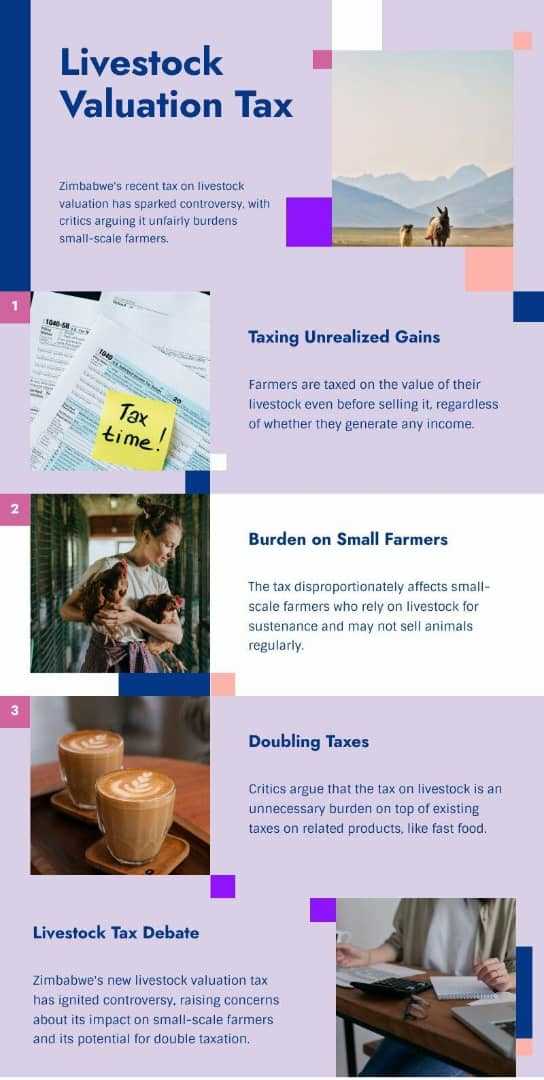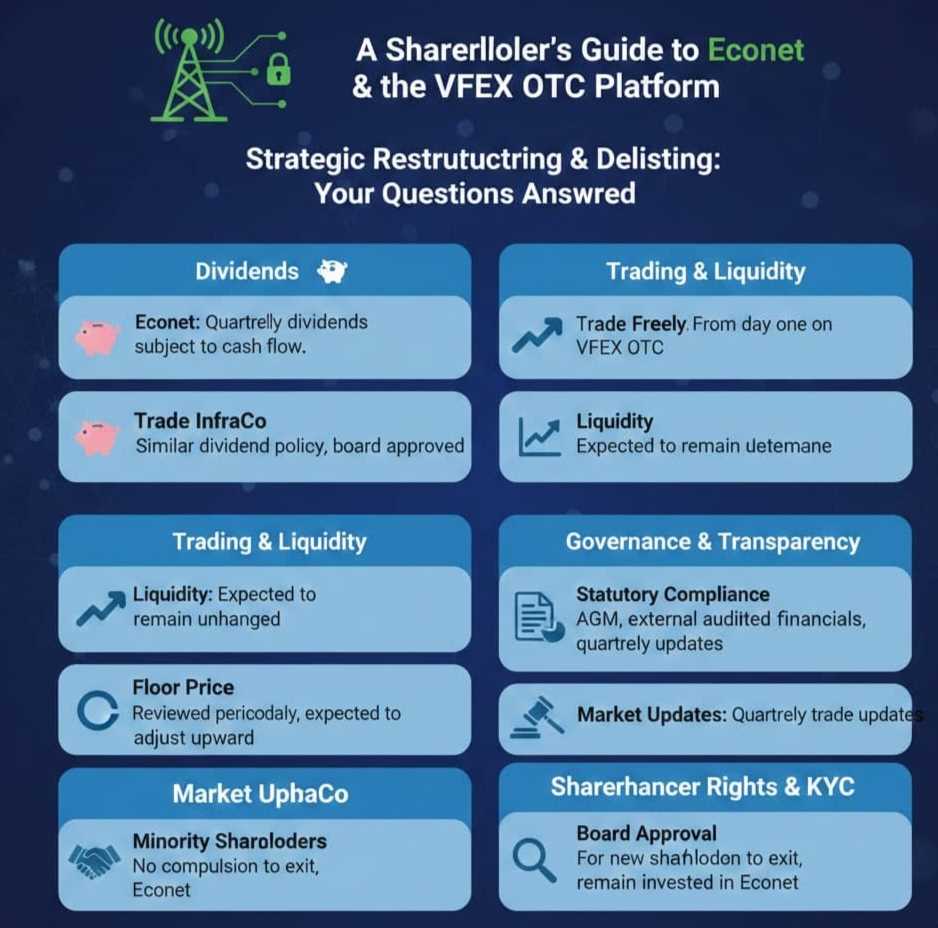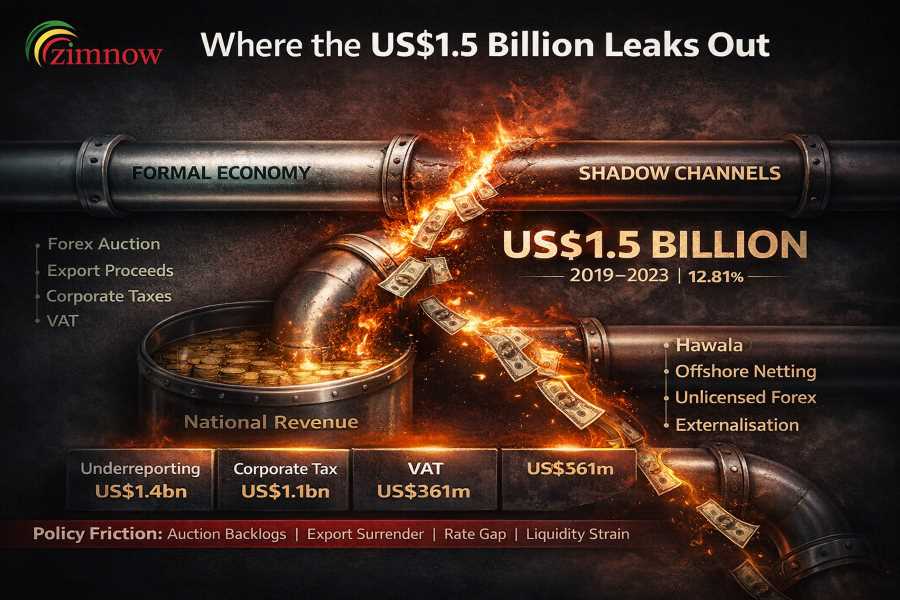
Nyashadzashe Ndoro
Chief Reporter
Critics are slamming the Zimbabwe Revenue Authority's decision to tax livestock, calling it a "non-progressive" and "problematic" move that will disproportionately affect small-scale farmers and livestock owners.
ZIMRA has recently shed light on the valuation of livestock for taxation purposes, emphasising the importance of accurate reporting in accordance with the Income Tax Act. However, the tax has drawn criticism from experts and activists, who argue that it essentially taxes unrealized gains.
According to ZIMRA, farmers are required to include the value of closing stock as part of their gross income, which includes a wide range of livestock such as cattle, sheep, goats, pigs, crocodiles, poultry, horses, ostriches, and zebras.
The tax collector distinguishes between two categories of livestock: stud and ordinary, with stud livestock intended for breeding purposes and ordinary livestock either born on the farm or purchased for reasons other than breeding.
Farmers are allowed to choose their valuation method for livestock, which must be made during the first income return and is subject to the approval of the Commissioner of ZIMRA. Once approved, these values remain in effect until a review is deemed necessary by the farmer.
"In terms of Section 8 (1) (h) of the Income Tax Act as read with paragraph 10(1) of the Second Schedule to the same Act, a farmer is required to include the value of closing stock as part of gross income," ZIMRA stated in a notice.
"Livestock includes cattle, sheep, goats, pigs, crocodiles, poultry, horses, ostriches, zebras, etc, and further classified into stud and ordinary livestock depending on its purpose.
"Stud livestock is for breeding purposes, while ordinary livestock is born on the farm or purchased other than for breeding purposes."
However, in an interview with ZimNow, Chenayi Mutambasere, a development economist at The Africa Centre for Economic Justice, has criticised the tax, arguing that it is highly non-progressive and problematic.
"Livestock are not consistently income-generating assets; they are long-term fixed assets used for breeding, farming and sometimes wealth storage.
"Unlike cash crops or direct commercial products, livestock does not necessarily bring in annual or regular revenue. Farmers may keep animals for future breeding, sustenance, or emergency sales rather than immediate profit.
"Taxing livestock as part of gross income creates an undue burden, especially for subsistence farmers and small-scale livestock owners who may not be selling animals regularly," Mutambasere said.
Mutambasere further argued that the tax system essentially taxes unrealized gains, meaning a farmer is taxed on livestock valuation even before any sale or actual income is generated.
Related Stories
"This tax system essentially taxes unrealized gains, meaning a farmer is taxed on livestock valuation even before any sale or actual income is generated," she stated.
"This is not an income tax, but rather a tax on wealth or ownership, which contradicts normal tax principles.
"If the government taxes livestock just for being owned, what will they tax next? Crops before harvest? Farm tools and machinery just for existing?Households for the number of children they have? This sets a dangerous precedent for taxing non-liquid assets, which could lead to more aggressive and arbitrary taxation policies in the future. It’s just preposterous."
Nixon Nyikadzino, a social development activist, also criticised the tax, arguing that it is a form of "stone age" taxation that doubles taxes on the same people.
He cited the recently introduced tax on fast foods, stating that it is already taxing the end product of livestock. Nyikadzino further argued that the tax is being used to feed the "kleptocracy and litocracy" in Zimbabwe, and that the powers that be are part and parcel of the looting.
"This stone age approach is doubling taxing on the same people who are now being taxed as fast foods," Nyikadzino stated.
"The tax on fast foods. The same livestock is where the butcher is and is where the people who actually cook and sell food are getting the meat. So how do you then tax the same people again on the end product?
"In other words, they are fleecing people in order to satisfy their gluttony. And so to speak, they have a gourmandizing appetite for money. Something that we are witnessing everywhere in government.
"And don't be surprised that tooling on the other end, beside the likes of Chivayo, is also being used as a work to get every cent from the empty pockets of Zimbabweans in order to feed the kleptocracy and the litocracy in this country called Zimbabwe.
"It's unfortunate that the powers that be are part and parcel of the looting. And the taxing has become one of the easiest ways of looting from the ordinary person who is already suffering from the current economic hardships."
Mai Shumba, a subsistence farmer from Gweshe, Mashonaland Central, questioned why the government would want to tax her on something that does not generate income regularly.
"I'm just trying to make ends meet and feed my family. I have a few cattle and goats, but I don't sell them regularly. This tax on livestock valuation is a huge burden for me. I don't have the money to pay for it, and I don't see why I should be taxed on something that is not even generating income for me. It's like the government is punishing me for trying to survive," she said.
The broke government has rolled out a slew of taxes aimed at ramping up revenue. These include a tax on sugary soft drinks and a 1% levy on fast food outlets.
Additionally, citizens are contributing to an AIDS levy and paying excise duties on alcohol, which Finance Minister Mthuli Ncube asserts are vital for funding public healthcare.
The sugar tax, in particular, has been a topic of debate, with some arguing that it will lead to increased smuggling and harm local businesses.
Zimbabweans are already shouldering a significant tax burden, with various levies and duties in place.




















Leave Comments